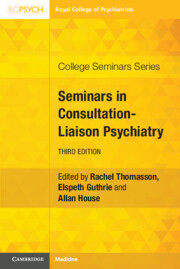Book contents
- Seminars in Consultation-Liaison Psychiatry
- College Seminars Series
- Seminars in Consultation-Liaison Psychiatry
- Copyright page
- Contents
- Contributors
- Chapter 1 The Assessment Process in Consultation-Liaison Psychiatry
- Chapter 2 Notes on Training Pathways in Consultation-Liaison Psychiatry
- Chapter 3 Nursing in Consultation-Liaison Settings
- Chapter 4 Psychological Reaction to Physical Illness
- Chapter 5 Self-Harm and Suicidal Thoughts
- Chapter 6 Depression in Medical Settings
- Chapter 7 Functional Somatic Symptoms
- Chapter 8 Alcohol Misuse
- Chapter 9 Substance Misuse
- Chapter 10 Psychosis in General Hospital Settings
- Chapter 11 Acute Behavioural Disturbance in the General Hospital
- Chapter 12 The Neurology–Psychiatry Interface
- Chapter 13 Perinatal Psychiatry
- Chapter 14 Paediatric Consultation-Liaison Psychiatry
- Chapter 15 Psychological Treatment
- Chapter 16 Legal and Ethical Issues in Consultation-Liaison Psychiatry
- Chapter 17 Social Aspects of Consultation-Liaison Psychiatry
- Chapter 18 Education for Acute Hospital Staff
- Chapter 19 Considerations in the Planning and Delivery of Consultation-Liaison Psychiatry Services
- Chapter 20 Outcome Measurement in Consultation-Liaison Psychiatry
- Chapter 21 The Evidence Base for Consultation-Liaison Psychiatry
- Chapter 22 Primary Care Consultation-Liaison Services
- Chapter 23 Emergency Department Psychiatry
- Chapter 24 Setting Standards for Consultation-Liaison Psychiatry Services
- Chapter 25 Policy to Practice
- Chapter 26 Consultation-Liaison Psychiatry
- Index
- References
Chapter 20 - Outcome Measurement in Consultation-Liaison Psychiatry
Published online by Cambridge University Press: 04 January 2024
- Seminars in Consultation-Liaison Psychiatry
- College Seminars Series
- Seminars in Consultation-Liaison Psychiatry
- Copyright page
- Contents
- Contributors
- Chapter 1 The Assessment Process in Consultation-Liaison Psychiatry
- Chapter 2 Notes on Training Pathways in Consultation-Liaison Psychiatry
- Chapter 3 Nursing in Consultation-Liaison Settings
- Chapter 4 Psychological Reaction to Physical Illness
- Chapter 5 Self-Harm and Suicidal Thoughts
- Chapter 6 Depression in Medical Settings
- Chapter 7 Functional Somatic Symptoms
- Chapter 8 Alcohol Misuse
- Chapter 9 Substance Misuse
- Chapter 10 Psychosis in General Hospital Settings
- Chapter 11 Acute Behavioural Disturbance in the General Hospital
- Chapter 12 The Neurology–Psychiatry Interface
- Chapter 13 Perinatal Psychiatry
- Chapter 14 Paediatric Consultation-Liaison Psychiatry
- Chapter 15 Psychological Treatment
- Chapter 16 Legal and Ethical Issues in Consultation-Liaison Psychiatry
- Chapter 17 Social Aspects of Consultation-Liaison Psychiatry
- Chapter 18 Education for Acute Hospital Staff
- Chapter 19 Considerations in the Planning and Delivery of Consultation-Liaison Psychiatry Services
- Chapter 20 Outcome Measurement in Consultation-Liaison Psychiatry
- Chapter 21 The Evidence Base for Consultation-Liaison Psychiatry
- Chapter 22 Primary Care Consultation-Liaison Services
- Chapter 23 Emergency Department Psychiatry
- Chapter 24 Setting Standards for Consultation-Liaison Psychiatry Services
- Chapter 25 Policy to Practice
- Chapter 26 Consultation-Liaison Psychiatry
- Index
- References
Summary
outcome measurement in healthcare is to establish the effect of a clinical or organisational activity. A useful initial step is therefore to clarify not just what outcome is being assessed but also what activity is being evaluated by measuring that outcome. In terms of describing the activity of liaison psychiatry, the service can be understood as a complex intervention in healthcare. That is, it has multiple components, each with its own mechanism of action and possible effects. This raises a fundamental question about outcome measurement – what part of this complex system is being evaluated? Before considering the particulars of outcome measurement, we therefore need to have a way of characterising liaison services and how they might work.
- Type
- Chapter
- Information
- Seminars in Consultation-Liaison Psychiatry , pp. 328 - 344Publisher: Cambridge University PressPrint publication year: 2024

